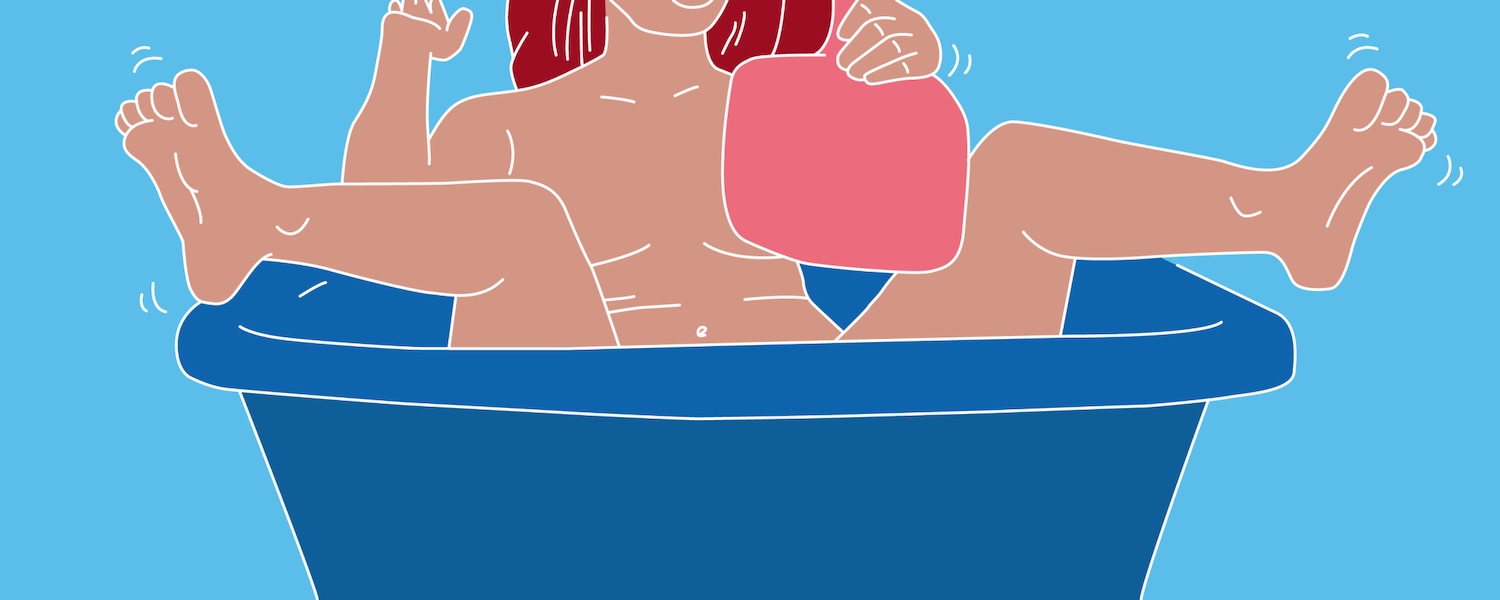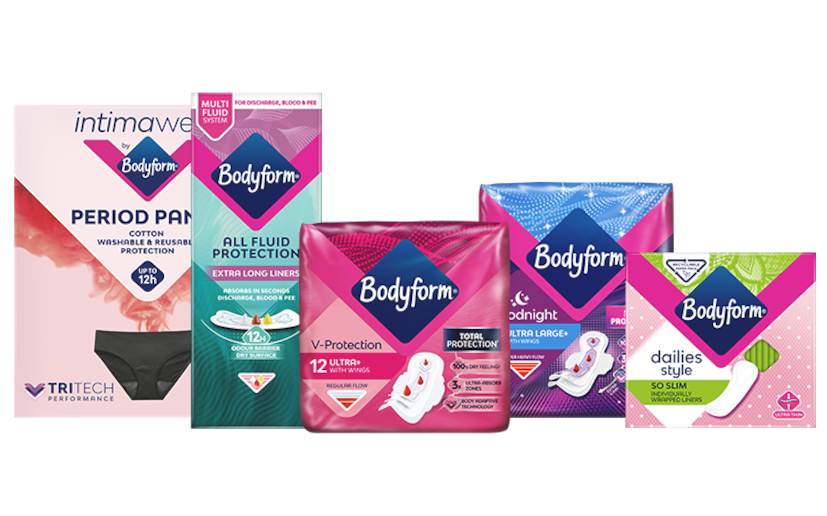Physical changes during puberty

As we grow and mature, our body goes through many changes too. Puberty can be an overwhelming and confusing time, but don’t worry, these changes are normal and learning more about them can help you feel better. Here’s what you need to know.
Out-of-control pubes, pimples, and uneven boobs – these sudden changes can be exciting, confusing, and daunting all at the same time. Luckily, there are ways to navigate around it! So try to keep calm, as puberty is just your body’s way of telling you that you’re growing up.
Some of us are caught by surprise by these changes, while others might have to wait for what feels like an eternity. Everyone experiences adolescence differently, so, how, where, and when it happens is unique for each of us. But as a rule of thumb, it usually happens between the ages of 10 and 16.
While you won’t wake up one morning looking and feeling completely different, your body will gradually come to seem a little new and unknown. You might notice you go up a couple of bra sizes in a few months, but your jeans still fit. Or you might find your knicker elastic is digging into your hips, but you barely even need a bra. Sometimes the changes are rapid, sometimes they’re slow, and not every body part develops at the same time.
Let’s take a closer look at what physical changes our bodies go through during puberty and learn some tips on how to cope with it.
Physical changes during puberty
Puberty brings with it a lot of new experiences.
It all starts in our brain, where our pituitary gland (a pea-shaped gland that sits just under the brain) sends out a message to the ovaries to start producing oestrogen (the female hormone). This triggers a physical response that prepares our bodies for having a baby one day (although many people choose to live child-free, and that's absolutely fine too).
You may notice that your breasts have grown, and your hips are wider. You may also spot vaginal discharge in your pants and hair growing everywhere, including your V-Zone (which refers to everything to do with our vagina, vulva and the V-shaped front of our body).
So, what happens exactly?
Sore breasts and hard nipples
For many of us, breasts tend to be one of the first things to develop during puberty. Your nipples might be harder than what you’re normally used to, which is an early sign that they’re about to sprout. [1] During this time, boobs can become lumpy and tender, even a bit painful.
You may also find that your breasts are slightly uneven. Let’s just say that they certainly have a personality of their own – so a slight difference in size is totally normal even after boobs fully develop. The size and shape of your breasts will likely keep changing throughout your life as lots of things can affect them such as losing or gaining weight, going through pregnancy, and breastfeeding. Although it can be tempting to compare ourselves to others, remember that we all have different body types so it’s natural for your breasts to look different from other people’s!
Some women+ like to wear bras to ease discomfort, for example when doing sports. If you find that choosing the right bra size is confusing (and have no clue what 32A or 36B even means), going bra shopping with one of your parents, siblings, or friends can be helpful. But you can also choose not to wear a bra if that makes you feel more comfortable – the decision is completely yours!
Hair, hair, everywhere

Armpit hair, stomach fluff, pubes... there’s all kinds of hair popping up around your body during adolescence. But are you supposed to do anything about it?
Well, the short answer is, only if you want! There is no right or wrong when it comes to deciding what to do with your hair – you should do what feels right for you.
If you do want to try hair removal or a trim, it’s worth giving it some thought and sharing how you feel with a parent, sibling, or friend — they might have a few tips! Consider that some methods like getting waxed or laser hair removal can be expensive, painful, and not always effective. There can also be side effects, including redness, irritation, or bruising. So, ask yourself before going ahead: ‘Am I doing it for me or just because I feel pressured to?’
Remember that everyone grows pubic and body hair (some more than others) and there is nothing dirty or shameful about it so it’s up to you whether you wish to keep or remove it.
Wider hips and stretch marks

Fat (which gets a bad rep but is necessary in healthy doses for our bodies to function properly), muscle, and bone all change during puberty, and this affects the shape of our bodies.
For example, some of us may gain a little weight (especially on our hips, thighs, and bums) before a growth spurt. It’s not always easy to embrace your changing shape but try not to beat yourself up about it... it’s all completely natural. What’s important is that you eat well (lots of veggies, fruit, and water!) so your body can continue developing. Doing some exercises might be a good idea too.
As your body shape starts to change, you might also see some stretch marks (those “tiger stripes” which can appear on your calves, thighs, hips, boobs – practically anywhere). They’re completely normal and a natural way your skin works when it needs to cover more body area, so it’s okay to just leave them be. Your body is doing exactly what it’s meant to – so try to love yourself and embrace those stripes!
Growth spurts
"Spurt" is the word used to describe a short burst of activity, something that happens in a hurry – and a growth spurt is just that.
As you enter adolescence, it might seem that your sleeves are always getting shorter, or your shoes are constantly shrinking – that’s because you’re experiencing major growth spurts. Usually, they happen over the course of 2 to 3 years.
Growth spurts happen to us all at different times so don’t be surprised if one day your friend shoots up while you remain shorter or if you suddenly become the tallest person in your class, everybody grows differently!
Periods – it’s about bloody time
During puberty, your ovaries start producing oestrogen which ultimately means that menstruation is around the corner. Although you may not start your periods immediately, you’ll probably get white discharge in your pants, which is a sign your first period will arrive soon-ish.
Vaginal discharge is totally natural, but if it makes you feel uncomfortable, you could try wearing liners. They are absorbent products designed for daily wear and can help you feel fresh (as long as you change them regularly).
When your first period arrives, it may well be light, irregular, or just a little ‘spotting’ (specks of blood on your underwear). Since it’s impossible to know exactly when the time will come and how heavy your flow will be, it’s always a good idea to make sure you have period products handy, whether that’s pads, tampons, or even period pants.
Strong body odour and excessive sweat
Your sweat glands work harder during puberty, meaning you get sweatier and have a stronger body smell – especially under the armpits and around the groin area. [2] Although these smells might not be pleasant, they’re completely natural.
Coping with them is all about sticking to a regular personal hygiene routine. For example, taking a daily shower is a great way to keep yourself feeling (and smelling) clean and fresh. Wearing underarm deodorant is also a good idea, especially if you’re doing lots of sports.
Your V-Zone may also feel sweatier than usual during puberty and it’s likely you’ll also start noticing the scent of your vagina (the internal bits). It’s all completely normal and natural, and the good news is others can’t tell.
While sticking to a good intimate hygiene routine is important, keep in mind that you shouldn’t wash your vagina or use any harsh deodorants or fragrances. Your vagina is self-cleaning and naturally maintains the acidity level (pH) balanced with just the right amount of healthy bacteria in there.
What you should keep clean, though, is your vulva (the external bits of your V-Zone). Along with sweat, it also comes into contact with discharge, pee, and period blood. So, a good tip to keep the area clean, is washing it with warm water. You can also use mild intimate wash gels that respect your vulva’s natural pH to keep your vulva clean. And, if you’re out and about, you can top that off with intimate wet wipes, which is a quick and convenient way to freshen up in a jiffy.
Hormonal changes and acne
About 95% of people aged 11 to 30 are affected by acne at some point, so if those pesky zits have started showing up on your body, you’re not alone! [3]
Hormones (such as testosterone) and genetics are a couple of reasons we might get spots on our face, chest, neck, or back during puberty. When our hormone levels shift, our skin produces more oil, which mixes with bacteria on the pores of the skin and causes acne.
The best thing you can do is to leave it alone, as popping zits only makes it worse. It’s hard to resist, but attempting to pop or squeeze your pimples can push bacteria and pus deeper into the skin, which might cause infection, scarring, and delay the healing process.
If acne is getting on your nerves, you may want to try applying ice around the area for instant relief. But if your skin is particularly inflamed or taking a really long time to clear up, it’s a good idea to reach out to an adult so they can take you to a doctor. They will be able to tell if you should make changes in what you eat or if your skin needs treatment or medications.
Embrace the new you, one step at a time
No one said puberty would be easy but understanding the changes in your body and realising how natural they are can help you see just how unique you are, and how incredible your body is.
It can seem really alien at first when you’re getting an adult body, but you might still feel like a kid. As overwhelming as it may be at first – remember that it won’t last forever. Everyone in your life has gone through – or will go through – this stage, so don’t beat yourself up about it. Besides, change can be wonderful!
Going through puberty can feel like a lot at times, so it’s okay to take a step back and give yourself some space to process everything that’s going on with your body. And remember, you’re not alone. You can also try talking to friends and family or even a teacher if it helps... you might be surprised at how good you might feel afterwards!
If you’d like to learn more, why not take a further look at how to deal with emotional changes during puberty and how hormones play a part in it?
[References]
[1] https://www.childline.org.uk/info-advice/you-your-body/puberty/puberty-girls/



